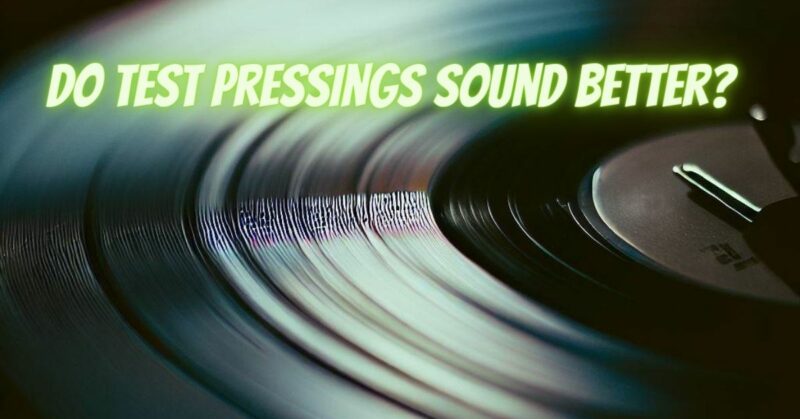In the realm of vinyl records, test pressings occupy a special place, often generating curiosity and debate among collectors and audiophiles. Test pressings are preliminary vinyl copies produced to evaluate the quality and sound of a recording before the final production run. The question that arises is whether test pressings truly sound better than regular pressings. In this article, we’ll explore the intricacies of test pressings, their significance, and whether they genuinely offer a superior auditory experience.
The Essence of Test Pressings:
1. Early Production Stage: Test pressings are typically among the first copies made during the vinyl production process, serving as a quality control measure.
2. Evaluation: Musicians, producers, and label executives use test pressings to assess audio fidelity, sound quality, and potential issues before giving the final go-ahead for mass production.
3. Limited Availability: Test pressings are usually limited in number and are often sought after by collectors due to their unique status.
The Perception of Sound Quality:
1. Unaltered Master: Test pressings are often cut from the same master recording as regular pressings, meaning they share the same source audio.
2. Sound Consistency: In theory, test pressings should sound nearly identical to regular pressings, as they are cut from the same source material.
3. Potential Variability: The quality of test pressings can vary depending on the mastering, pressing plant, and other factors that affect vinyl production.
Factors Influencing Perceived Quality:
1. Mastering Quality: The quality of the original master recording plays a significant role in the overall sound of both test pressings and regular pressings.
2. Pressing Plant: The pressing plant’s equipment and techniques can impact the final sound quality of both test and regular pressings.
3. Vinyl Quality: The type and quality of vinyl used for both test pressings and regular pressings can influence sound clarity and fidelity.
4. Equipment: The quality of playback equipment, including turntables, cartridges, and speakers, affects how the sound of test pressings is experienced.
Collectibility and Rarity:
1. Unique Appeal: Test pressings hold a special allure due to their limited availability and connection to the recording process.
2. Collector’s Item: Due to their unique status and scarcity, test pressings are often sought after by collectors, contributing to their appeal.
While the notion of test pressings sounding better than regular pressings might stem from their exclusive nature, the reality is that they typically offer a similar sound experience. Both test pressings and regular pressings are cut from the same master recording, and the nuances in sound quality are often due to factors like mastering, pressing techniques, and equipment quality. Collectors value test pressings for their uniqueness and early production status, but in terms of sonic quality, the distinction is not as pronounced as one might expect. As you explore the world of vinyl, remember that the joy of music appreciation goes beyond the technicalities, embracing the experience of immersing yourself in the analog charm of vinyl records.


